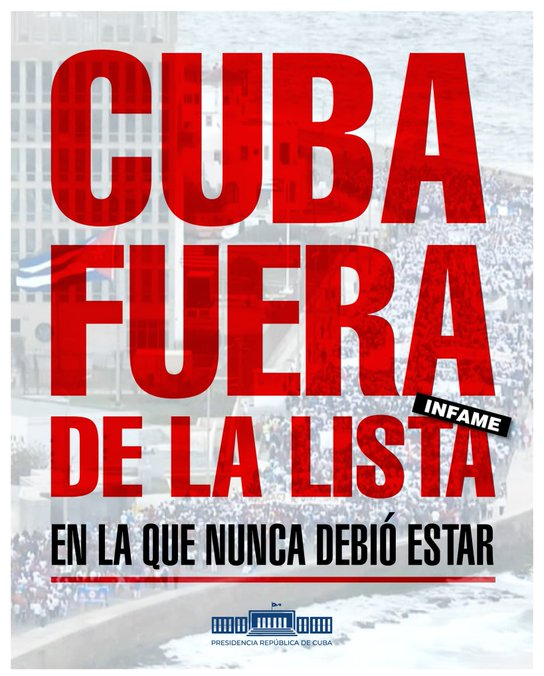
@PresidenciaCuba
By: Roberto Morejón
Acknowledging that the measure had previously been requested by international actors, the US administration of Joseph Biden has finally removed Cuba from a list of countries that Washington considers sponsors of terrorism.
In addition to being unjust, the inclusion was based on tricks and falsehoods and was adopted by the first administration of Donald Trump as a sop to the extreme right of the Cuban-born emigration.
Trump's successor in the White House, Democrat Joseph Biden, supported it despite its inconsistency, rejection and denunciation by the largest of the Antilles.
Human rights organizations and U.S. congressmen, as well as governments, including that of Colombia, have also made requests in this regard.
Since his inauguration, President Gustavo Petro has asked the United States to put an end to the illegitimate listing of Cuba, in addition to highlighting the positive role played by Havana in the peace talks.
Another US ruler, Barack Obama, had removed the largest of the Antilles from the adulterated inventory in 2015, when Washington and Havana began a phase of normalization of relations.
The government of the Caribbean archipelago has denounced, in international forums and in conversations with counterparts from other countries, the harmful effects of Cuba's inclusion in the aforementioned list.
This designation, together with the U.S. blockade, is a heavy burden on the economy, financial transactions, access to credit and trade.
For these two reasons, Cuba today faces acute material shortages that affect the standard of living of its citizens.
The application of Chapter III of the Helms-Burton Act, which is the basis for the ability of U.S. citizens to sue in U.S. courts for the expropriation of what they consider to be their property in Cuba, is also aimed at deepening the hardships.
In addition to the two steps mentioned above, the Biden administration eliminated the list of restricted Cuban entities, which identifies a group of institutions with which U.S. citizens and institutions are prohibited from engaging in financial transactions.
In a swift response, the Cuban Foreign Ministry described the announcements as steps in the right direction, albeit limited.
It recalled the persistence of the blockade and a good part of the dozens of coercive measures put in place in 2017 to tighten it.
For Cubans, it is clear that the clarifications reported in Washington should have been carried out much earlier, since the arguments were numerous, in addition to the fact that the permanence of a cruel policy to suffocate a neighboring country is unjustifiable.
The Cuban government has just reaffirmed that it will continue its confrontation and denunciation of this policy.
But, it added, it remains willing to maintain a respectful relationship with the United States, based on dialogue and non-interference in the internal affairs of both countries.
Well, the White House reports that it will use its presidential prerogative to prevent such actions from being taken in U.S. courts.

